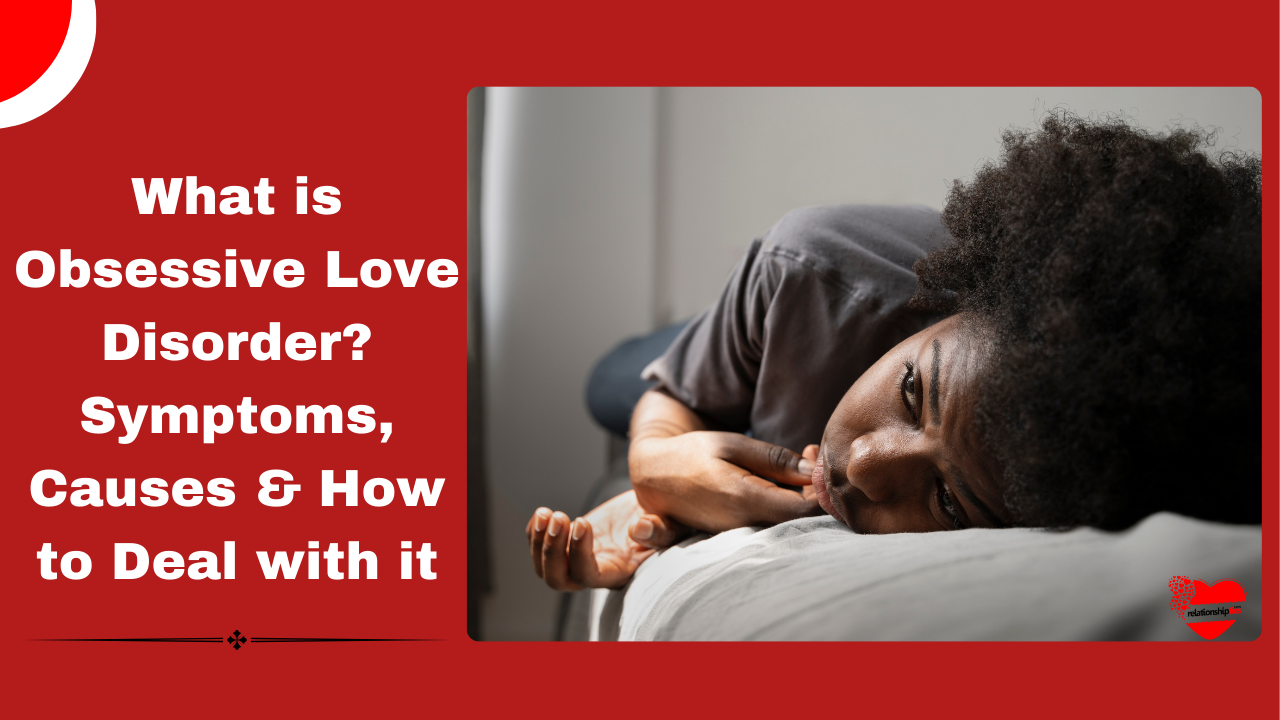Obsessive Love Disorder, a captivating yet often misunderstood phenomenon, has intrigued psychologists and love enthusiasts alike.
Imagine a love so intense that it consumes your every thought, leading to an overwhelming urge to possess and control the object of your affection.
This article aims to unravel the enigma behind Obsessive Love Disorder, exploring its symptoms, causes, and most importantly, how to navigate its complex terrain.
From infatuation turning into fixation to the blurred lines between genuine affection and unhealthy obsession, understanding this disorder is crucial for both individuals who may be experiencing it and those seeking insight into the complexities of human emotion.
This article answers the question ‘What is Obsessive Love Disorder?’ its Symptoms, Causes & How to Deal with it.
Table of contents
What is Obsessive Love Disorder?
This kind of deep and all-consuming infatuation can cause unreasonable actions and obsessive thoughts regarding the object of one’s attention.
Obsessive love disorder or just obsessive love is about focusing excessively on one person you calm to be emotionally attached to.
Strong emotions are normal in relationships, but even when a relationship is causing them pain, people with obsessive love disorder may display possessiveness, jealousy, and an inability to let go.
This illness can have a substantial negative effect on a person’s emotional health and social functioning, which frequently makes it difficult to set up healthy boundaries and make sound relationship decisions.
While strong feelings are a natural component of love relationships, it’s crucial to understand that they shouldn’t be overwhelming or harmful to one’s mental health.
Comprehending the intricacies of obsessive love disorder necessitates a humane approach that attends to the person undergoing these intense emotions as well as their possible influence on their object of affection.
For individuals coping with this disease to receive adequate support, this condition must be acknowledged as a real psychiatric problem.
Read Also: What Is Golden Child Syndrome: Signs & How to Deal with it
What are the Obsessive Love Disorder Symptoms?
The Diagnostic and Statistical Manual of Mental Disorders (DSM-5) does not formally identify obsessive love disorder as a separate diagnosis, however, people who have strong, harmful obsessions with love may present with a variety of symptoms.
Their everyday functioning and emotional well-being may be greatly impacted by these symptoms. The following are some typical indications and manifestations of compulsive love:
1. Constantly Thinking About the Person
One of the key signs of Obsessive Love Disorder is the inability to stop thinking about the person you are obsessed with. You may find that thoughts of them consume your mind throughout the day, making it challenging to focus on other aspects of your life.
These thoughts can be intrusive and persistent, often leading to a preoccupation with the person’s actions, whereabouts, and well-being.
2. Preoccupation with the Person:
An individual suffering from obsessive love may be fixated on the subject of their adoration, thinking about them excessively, visiting their social media accounts, or taking part in other actions that feed the fixation.
Read Also: Best Zodiac Sign | What are the Best Zodiac Signs for Relationships?
3. Believing in a Fictitious Relationship:
Individuals suffering from this disease could have exaggerated notions about the type and intensity of their relationship with the target of their obsession. This can entail thinking that they are meant to be together or that the other person secretly loves them.
4. Excessive Jealousy and Possessiveness
Individuals with Obsessive Love Disorder often exhibit extreme jealousy and possessiveness towards their object of obsession.
They may become overly suspicious of any interactions the person has with others, even if they are entirely innocent.
This jealousy can lead to controlling behaviours, such as monitoring their partner’s phone or social media activity, isolating them from friends and family, or constantly questioning their loyalty.
5. Having Trouble Taking Rejection:
People who suffer from obsessive love may find it difficult to accept when their emotions are not returned. Even when the person shows overt signs of rejection or disinterest, they might still pursue them.
6. Emotional Unrest:
Significant mental pain, such as anxiety, despair, and mood swings, can result from obsessive love. When the object of their passion responds favourably, the person may feel a wide variety of strong emotions, from joy to desperation and despair when they are rejected.
7. Occupational and Social Functioning Impairments:
Their obsession with the object of their adoration may cause them to perform less well in social and professional contexts. The person could disregard their responsibilities to their family, friends, and job, among other facets of their existence.
Read ALSO: What is a Dysfunctional Family: Signs, Causes and How To Cope
8. Neglecting Self-Care
When someone is consumed by Obsessive Love Disorder, they often neglect their self-care and well-being.
They may prioritize the needs and desires of the person they are obsessed with over their own, sacrificing their happiness and fulfilment in the process. This can lead to a decline in physical and mental health, as well as a loss of personal identity.
9. Extreme Mood Swings
Obsessive Love Disorder can cause individuals to experience intense mood swings. They may go from extreme highs when they feel that their obsession is reciprocated or when they have contact with the person, to extreme lows when they perceive any form of rejection or distance. These mood swings can be unpredictable and disruptive to their overall emotional well-being.
10. Separation:
People who suffer from obsessive love may isolate themselves from other people and devote their entire attention to the object of their obsession. Isolation and a lack of other people’s support may result from this.
What Causes Obsessive Love Disorder?
O.L.D., or obsessive love disorder, is a disorder that can have a serious negative effect on a person’s relationships and emotional health.
When someone has this illness, they frequently have strong, overwhelming feelings for someone, which can result in compulsive thoughts and actions.
Although the precise causation of O.L.D. remains unclear, several factors may play a role in its development.
Style of Attachment
The attachment style of a person may be a contributing factor in Obsessive Love Disorder. Childhood experiences shape our attachment styles, which can have an impact on how we establish and sustain relationships as adults.
Individuals who have an anxious or concerned attachment style are more likely to experience O.L.D. This attachment type is typified by an excessive dependence on one’s spouse, a fear of being abandoned, and a need for frequent reassurance.
Open-ended Trauma
The emergence of obsessive love disorder can also be attributed to unresolved trauma from prior experiences.
Deep emotional scars from traumatic experiences, like being abandoned or betrayed, might show up as compulsive thoughts and actions toward a person to reclaim control or security. Unresolved traumas have the potential to start an obsessional and fearful cycle that ends in O.L.D.
Read ALSO: What is Sibling Sexual Abuse? | Facts, Signs, and Effects
Low Self-esteem
Obsessive Love Disorder may be more likely to develop in people who have low self-esteem. A person with low self-esteem could turn to their relationships for approval and a sense of value.
This may cause them to become unhealthy and dependent on their relationship and develop a severe dread of losing them, which may result in compulsive thoughts and actions.
Effect of Media
Our ideas about relationships and love are greatly influenced by the media. Unrealistic depictions of love in literature, film, and television can lead to the development of obsessive love disorder by raising irrational expectations.
Individuals may develop an obsession with the concept of the ideal romantic partner and resort to compulsive actions to fulfil this romanticized vision of love.
Biochemical Elements
It’s unclear how much biology plays a part in obsessive love disorder, but there might be some genetic or neurological components.
Studies have revealed that the regulation of emotions and attachment may be influenced by specific neurotransmitters, including serotonin and dopamine. Unbalances in these neurotransmitters may have played a role in the emergence of O.L.D.
Read ALSO: What Is an Almond Mom? Signs & Ways to Deal
How to Deal with Obsessive Love Disorder
Obsessive Love Disorder (OLD) can be an overwhelming and challenging experience for both the person affected and their loved ones.
This mental health condition is characterized by an intense and uncontrollable fixation on someone, often leading to intrusive thoughts, extreme jealousy, and possessiveness.
If you or someone you know is struggling with OLD, it’s important to understand that there is hope and help available.
Recognizing the Signs of Obsessive Love Disorder
Before delving into coping strategies, it’s crucial to recognize the signs and symptoms of OLD. While it’s normal to feel infatuated or passionate about someone, individuals with OLD experience these feelings to an extreme degree, often interfering with their daily lives and relationships. Some common signs of OLD include:
- Constantly thinking about the person to the point of obsession
- Feeling an intense need for control over the person
- Becoming overly possessive or jealous
- Engaging in stalking behaviors, both online and offline
- Difficulty focusing on anything other than the person
Seeking Professional Help
If you suspect that you or someone you care about may be struggling with OLD, it’s crucial to seek professional help. A mental health professional, such as a therapist or counsellor, can provide the necessary guidance and support to navigate through this challenging disorder. They can help you understand the underlying causes of your obsession and develop healthy coping mechanisms.
Building a Support System
Dealing with OLD can feel isolating, but remember that you are not alone. Reach out to trusted friends and family members who can offer support and understanding.
Sharing your feelings and experiences with others can provide a sense of relief and help you gain perspective. Additionally, joining support groups or online communities specifically focused on OLD can connect you with individuals who are going through similar challenges.
Read Also: Top 15 Healthy Eating for Kids | Healthy Foods for Your Kids
Setting Boundaries
Establishing clear boundaries is crucial when dealing with OLD. It’s important to recognize that you cannot control or possess someone else. Focus on developing a healthy sense of self and maintaining your own identity outside of the relationship.
Communicate openly with your partner or loved one about your struggles and work together to establish boundaries that respect both of your needs.
Practicing Self-Care
Engaging in self-care activities is essential for your overall well-being when dealing with OLD. Prioritize activities that bring you joy, relaxation, and a sense of fulfilment. This could include exercise, meditation, creative outlets, spending time in nature, or seeking professional help through therapy or counselling.
Cognitive-Behavioral Therapy
Cognitive-Behavioral Therapy (CBT) is a commonly used therapeutic approach for managing OLD. CBT helps individuals identify and challenge negative thought patterns and beliefs that contribute to obsessive behaviour.
Through therapy, you can learn healthier coping strategies and develop a more balanced perspective on relationships.
Practicing Mindfulness
Mindfulness techniques can be beneficial in managing obsessive thoughts and emotions associated with OLD. Mindfulness involves focusing on the present moment and accepting thoughts and feelings without judgment.
By practising mindfulness, you can learn to observe your thoughts and emotions without becoming overwhelmed by them, allowing for greater self-awareness and emotional regulation.
Embracing Patience and Persistence
Dealing with OLD is a journey that requires patience and persistence. Healing takes time, and setbacks may occur along the way. Be kind to yourself and celebrate small victories. Remember that every step forward, no matter how small, is a step in the right direction.
Read ALSO: 20 Proven Tips on How to Be a Good Mother
Conclusion
Obsessive Love Disorder is a serious condition characterized by an overwhelming fixation on a romantic partner, often leading to unhealthy behaviours and emotional distress.
The symptoms of this disorder can manifest in various ways, including intrusive thoughts, possessiveness, and irrational jealousy.
While the exact causes of Obsessive Love Disorder are not fully understood, factors such as past trauma, attachment issues, and low self-esteem may contribute to its development. Recognizing the signs and seeking professional help are crucial steps in dealing with this disorder.
It is important for individuals experiencing symptoms or those in relationships with someone exhibiting signs of Obsessive Love Disorder to seek support from mental health professionals and explore therapeutic interventions aimed at promoting healthy relationship dynamics.






